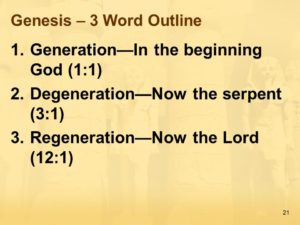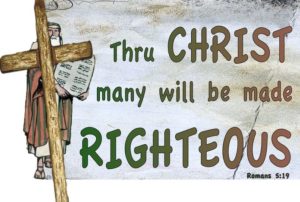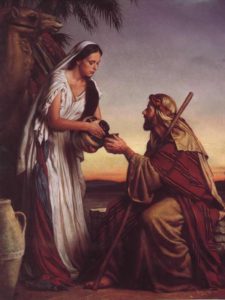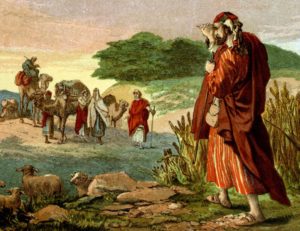TODAY’S READING FROM THE OLD TESTAMENT: GENESIS 23:1-24:51
For the purpose of understanding Genesis, G. Campbell Morgan divides the book into three sections.
The first section is titled, “Generation”. Here we see God as Creator and the King of Creation and mankind made in His image to have a relationship with Him. (Genesis 1-2).
The second section Morgan titles, “Degeneration” (Genesis 3:1-6:7). It is the story of sin and its impact upon society.
The third section is titled “Regeneration” and picks up the redemptive narrative of God calling and saving individuals with a view to providing salvation to the nations through the Promised Seed (Gen. 6:8 through to the end of the book).
“The principle subject is that of the life stories of individual and representative men, particularly Abraham, Isaac, Jacob and Joseph. Throughout all these, the supreme revelation is that of God seeking to restore men to obedience by restoring them to the main principle of human life, that of faith in Himself.”
Perhaps you have been disappointed with the behavior of Noah, Lot, and Abraham as you have been reading through the One Year Bible. They are not ideal models for making the best moral choices. Noah gets drunk and behaves in an embarrassing manner. Abraham continues to tell half-truths about his wife Sarah, putting her welfare and that of others at risk in order to protect himself. Lot settles in Sodom and there is little in the Old Testament account of his life that suggests that he had any prolonged walk with the Lord or godly testimony in the community. Yet the New Testament calls him “righteous Lot” (2 Peter 2:7).
We see a gospel pattern emerging here. It should encourage us. God works with sinners and provides a way for them to be declared righteous, not through their works of righteousness, but by faith in the only One who can justify the ungodly, Jesus Christ (Titus 3:5; Romans 4:5-6).
The real hero of the Bible’s story is the One whose presence is hidden behind the scenes– the One true God, the Redeemer, who calls us into a relationship with Himself. He presents us with the challenge of obedience. Will we believe His promise? In the case of Noah, Lot, and Abraham, the promises given prefigure the plan of salvation centered in the person and work of Jesus Christ (The Ark, The Promised Seed, the willing sacrifice of the Promised Son). In our case, it is the actual plan of salvation centered in Christ and His perfect provision for the atonement of our sin on the Cross.
By the obedience of One (God, the Son) many will be made righteous (those who believe; Romans 5:19). Abel believed God and the righteousness of the Son of God was credited to his account (see Hebrews 11:4). Noah believed God, entered into God’s provision for salvation (the ark) and was delivered from His wrathful judgment upon the old creation. He received as an inheritance the gift of righteousness (Hebrews 11:7). An inheritance is a free gift that is received through the good will of another. “Abraham believed God and it was credited to him as righteousness”. (Galatians 3:6; Romans 4:3;)
Today’s readings emphasize that to succeed in faith (trusting and obeying God) is to succeed in life. To fail in faith, is to fail in life.
Today’s reading from Proverbs restates this theme:
“My son, do not forget my teaching, but let your heart keep my commandments; For length of days and years of life and peace they will add to you. Do not let kindness and truth leave you; Bind them around your neck, Write them on the tablet of your heart. So you will find favor and good repute in the sight of God and man. Trust in the LORD with all your heart and do not lean on your own understanding. In all your ways acknowledge Him, And He will make your paths straight. “ (Proverbs 3:1-6)
Genesis 23 records the death of Abraham’s wife, Sarah, Isaac’s mother. Sarah had her faults, and so do we. But God named her ‘Sarah’, meaning ‘my princess’ (Genesis 17:15), and in the New Testament, her virtues are given as examples for Christian wives to follow (1 Peter 3:1-6). The Apostle Paul uses her as a picture of the grace of God (Galatians 4:21-31). And the writer of Hebrews lists her with the heroes of faith.
Hebrews 11:11 11 By faith even Sarah herself received ability to conceive, even beyond the proper time of life, since she considered Him faithful who had promised.
Abraham mourns for his deceased wife with tears. This is the second instance of weeping in the Bible. (The first were the tears of Hagar in Genesis 21:16). There will be tears shed throughout the Bible until the Lord wipes them away when He returns in Revelation 21:4.
Abraham and Sarah were pilgrims. They were not citizens of the place where Sarah died.
He asks the sons of Heth, local leaders near Hebron (Kiriath-Arba), for an honorable burial sight for his dear wife. Their respect for Abraham is evident as they offer Abraham the choicest of their own family tombs for Sarah’s burial. Instead, Abraham prefers a separate burial place for Sarah. These leaders approach Ephron, the son of Zohar, on his behalf. Abraham offers to pay Ephron, the full 400 shekels of silver asking price, for the cave of Machpelah plus the field that leads up to it. Ephron was shrewd and knowing that the need to bury Sarah’s body was imminent, He demands the field be purchased also. Abraham pays the full price, honoring his wife and trusting God to do the right thing by faith.
In Genesis 24 we see Abraham’s successful mission in finding a spouse for Isaac. Note the prophetic picture: The Father (Abraham) wants a bride for His Son (Isaac). He sends out a Messenger (who is not named and does not speak of Himself) who will communicate the good news in a far country, speak of the Son, invite the chosen one to be His bride and brings a down payment of His wealth as a pledge of an inheritance. The messenger here is a wonderful type of the Holy Spirit whom the Father has sent into the world with the gospel’s invitation to become part of His family if we are willing by faith to cleave to His Son. (See Ephesians 1:9-14) Believers become His Son’s bride, the church (Ephesians 5:25-27; 2 Corinthians 11:2; John 3:29; Isaiah 54:5; 62:5; Revelation 19:7-8; 21:2,9).
Notice Isaac’s part in all this. He is not anxious for a bride. He is trusting the plan of the Father and the work of the Messenger. He is meditating in the field with His affections set upon things above (Genesis 24:63). “Trust in the LORD with all your heart, and lean not on your own understanding; In all your ways acknowledge Him, And He shall direct your paths.” (Proverbs 3:5-6)
TODAY’S READING IN THE NEW TESTAMENT: MATTHEW 8:1-17
The New Testament reading also provides pictures of people of faith, trust, and obedience:
- The leper (the only record we have of anyone responding to the Sermon on the Mount by specifically coming to Jesus) Matthew 8:2.
Notice how Jesus tells the leper not to tell anyone after He heals him. He also asks the healed leper to go to the priest, as required by the Old Testament law, to be declared ‘healed’ and restored to the Israelite community.
- The centurion’s servant.
Notice how the centurion is commended by Jesus as he explains the nature of faith- Recognizing and submitting to Divine Authority. (Trust in the Lord with all your heart. Lean not on your own understanding).
- Jesus, as He heals Peter’s mother in law.
She is healed, not through any faith on her part, but on the basis of God’s sovereign mercy to show His faithfulness in Christ (Matthew 8:14). Jesus cares.
TODAY’S READING IN THE BOOK OF PSALMS: PSALMS 9:13-20.
The second half of this psalm, verses 9-20, deals with the faithful worshipers who have been persecuted and oppressed.
David knew that God protects his flock when they are under attack. So he calls upon them to give thanks and praise to the Lord. He cries out for personal deliverance (v.13-14) that he may publicize the Lord’s greatness. The Lord makes Himself known as His cause is vindicated among the nations.
The afflicted can be comforted by this knowledge, yet David makes an ongoing petition:
Psalm 9:19-20 19 Arise, O LORD, do not let man prevail; Let the nations be judged before You. 20 Put them in fear, O LORD; Let the nations know that they are but men. Selah.
TODAY’S READING IN THE BOOK OF PROVERBS: PROVERBS 3:1-6
Proverbs 3:1-6 1 My son, do not forget my teaching, but let your heart keep my commandments; 2 For length of days and years of life and peace they will add to you. 3 Do not let kindness and truth leave you; Bind them around your neck, Write them on the tablet of your heart. 4 So you will find favor and good repute in the sight of God and man. 5 Trust in the LORD with all your heart and do not lean on your own understanding. 6 In all your ways acknowledge Him, And He will make your paths straight.
Here we have practical wisdom to live by. Our job is to take His Word (His teaching, His commandments, His promises, His provisions) to heart. Trust Him. Acknowledge Him in all your ways. That is your job. His job is to direct your path and straighten it out! We get in trouble when we confuse our job description with God’s!
PRAYER: Father, we can trust in Your plan. Thank You for calling us into Your family through the message about your Son. We rejoice in the good news and bind ourselves to Him and His saving work on our behalf. We do this by faith. Thank you for the gift of your Holy Spirit who makes our union with Christ a reality! Once we were in a far country. Our sins made us ‘untouchables’ according to Your holy standards. But You sent Jesus to heal us. Every spot and blemish of sin has been removed in Your sight and we have been declared clean forever! We know this is true positionally. We thank You that when we agree with You, confessing our sins, You are faithful and just and honor the shed blood of Jesus on our behalf and continue to cleanse us from all unrighteousness!
Lord, help us to share this good news with others. We realize that there are so many people who are lost to Your love. Lord of the harvest, send forth laborers into Your harvest. Here we are, send us! Amen.
Yours in the harvest,
Pastor David
